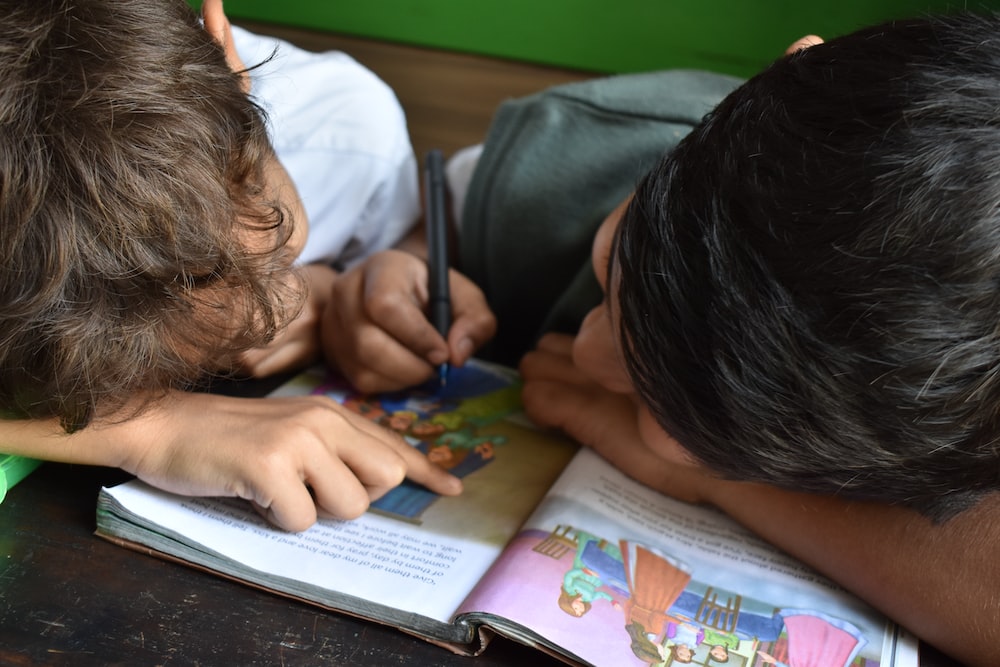- 1. Identify a suitable location to study
- 2. Ensure comfortable seating
- 3. Don’t study in the bed
- 4. Make sure that the study space is well-lit
- 5. Clear away clutter
- 6. Get the body ready for studying
- 7. Try having a study buddy
- 8. Create a proper study ritual and set realistic goals
- 9. Create a plan for play
- 10. Start with your favorite subject
Studying is an essential part of life that helps one improve their skills and gain the necessary knowledge to succeed. But does studying sound fun to everyone, especially when surrounded by distractions?
According to a study by Guidena, the longest time a grade 1 student can concentrate on a given task is about 7 minutes. In contrast, the expected attention span of grade 1 elementary school children is about 18 minutes. This helps us understand the need to address the vital question of how to stay focused while studying. It is essential to improve the attention span amongst the children to help them make the most of their learning abilities and ensure a bright future. In this article, we will try to understand why can’t kids focus on studying and explore effective ways to focus on studying to stay concentrated for longer.
Math & ELA | PreK To Grade 5
Kids see fun.
You see real learning outcomes.
Watch your kids fall in love with math & reading through our scientifically designed curriculum.
Parents, try for free Teachers, use for free
Why Can’t Kids Focus on Studies?

It can be commonly observed that kids energetically pile up their books and study materials only to lose excitement and get interested in other activities around them in no time. At other times, they do not want to study and must be forced to sit down and start reading. And it is even more challenging to keep them reading for a reasonable amount of time. So, before we discuss how to focus on studying, it is important to understand why kids find it so hard to focus.
Idleness / Playfulness
Kids may struggle to stay focused while studying due to a natural inclination towards playfulness or idleness. Their energy and curiosity can often divert their attention away from studying, making staying focused on academic tasks challenging.
Distractions
It is easy to get distracted, and it is even easier to get distracted while being surrounded by a lot of things. But the catch here is that kids only realize they got distracted once time slipped from their hands. Distraction due to screens is one of the primary reasons children cannot focus on their studies because newer apps, games, and never-ending notifications keep the users hooked with psychological tactics like FOMO (Fear of Missing Out). Other distractions include household distractions like guests coming to the house, video games, and gossip in the library, which are easy to get into but hard to ignore or resist, especially for children.
Daydreaming
Daydreaming results from issues like lack of interest, too much distraction caused by screens, curiosity about activities, or simply random imagination! And the more we imagine, the more stories we can build up, and the more we find it difficult to concentrate on the task.
While there is no magic ball to answer how to stay focused while studying, several strategies can significantly help children improve their concentration. The following section discusses ideas that can make a significant difference in kids’ study habits and help them stay focused.
Related Reading: Best Concentration Games for Kids to Develop Super Focus & Attention Skills
15 Strategies to Help Young Students Stay Focused While Studying

In today’s fast-paced and technology-driven world, staying focused while studying can challenge young students. Distractions are abundant, from smartphones and social media to television and video games. However, developing effective study habits and maintaining concentration is crucial for academic success. Let’s explore strategies on how to stay focused while studying , paving the way for their academic success.
1. Identify a suitable location to study
The first and foremost in the list of tips to focus on studying is to identify a suitable space where the kids feel energetic and comfortable. Every house has such corners, and kids have their favorite spaces. Some kids might prefer an outdoor location like the porch or the garden area, and others might prefer the peace of a library or their room. Some kids even love changing places to avoid getting bored and concentrate better. The takeaway is finding an appropriate place that best helps kids stay focused while studying.
2. Ensure comfortable seating
After finding the ideal location, the tip on how to focus better on studying is ensuring comfortable seating for the child. Kids need to use appropriate furniture to study effectively for a long time. A good body posture can only be maintained with proper furniture, and as per research, body posture can assist memory while learning new things.
3. Don’t study in the bed

Your cozy bed might be comfortable, but there are better places for studying. Use the bed for sleeping, resting, and pillow fights, but not for studying. Anyone studying in bed can unknowingly lean back, relax and get into lazy mode. And this certainly isn’t recommended when you want to stay focused while studying.
4. Make sure that the study space is well-lit
If the study area has improper lighting, the child will face difficulty reading. A well-lit study room is as important as studying itself; good lighting helps one stay alert and focused. An energized body and mind is essential to concentrate while studying.
5. Clear away clutter
Clutter is everything that distracts you and is an excellent tip if you are looking for ways how to concentrate on studying. As per a study, clearing clutter from the workspace resulted in a better ability to focus. This, in turn, led to a better performance by the people who participated in the study. Also, another research claims that clutter increases stress, anxiety, and sometimes even depression. So, tidy up the space and keep only those things on the table that one truly needs while studying.
6. Get the body ready for studying
Before one sits down to study, eat properly, drink enough water, and stretch a little. All this prepares the body and even the mind for learning. Also, a night of undisturbed sleep ensures a fresh mind and body, enabling the child to focus and study better.
7. Try having a study buddy

Just like laughter and yawning, concentration can be transmittable for some kids. Though every kid might be uncomfortable studying in a group or with a friend, it is very productive for some. You can try having a study buddy for your child who gets along well with them. Also, ensure that the study buddy is a good influence on your kid. They should be someone helping your kids to study better and not distract them further.
8. Create a proper study ritual and set realistic goals
Before encouraging the child to study, setting the goals clearly and having a proper study ritual is essential. The kid should know what they must study to strike an appropriate flow and focus. At the same time, the kids must know how long they have to study as it is essential to set an end time to avoid getting burned out.
Related Reading: Best Educational Goal Examples that Matter for Students & Teachers
9. Create a plan for play
Just as it is essential to have a proper study plan, there needs to be a well-defined play ritual too. So, schedule the downtime for the kids as per their interests. Also, ensure small breaks in between their study routine to help them relax and refresh. These little breaks can be made more interesting by adding small rewards to encourage them to stay focused while studying.
“Play is the highest form of research.” – Albert Einstein
10. Start with your favorite subject
How to stay focused while studying is difficult, but it becomes easy when studying your favorite subject. Start with their favorite subject to build interest and keep things going. A challenging subject can be introduced once the kids enter the groove of studying. But make sure to cover all the subjects, or your child might try to avoid the less exciting subjects altogether.
11. Exercise regularly

According to research, light physical activities like walking can significantly improve kids’ concentration levels. Any exercise that requires effort but does not exhaust the doer is light, and starting the day with 10 minutes of exercise goes a long way in keeping the body active and mind fresh throughout the day.
Related Reading: Workouts for Kids That Teaches Them Discipline & Focus
12. Focus on eating healthy food
Food is not just for the body; it is also essential for the mind. Kids who prefer eating junk food over healthy food are dull and lazy, have poor concentration levels, and find it difficult to focus and finish any given task in a reasonable amount of time. Thus, it is crucial to form healthy eating habits in kids. Ensure a healthy and balanced diet for your kid that energizes their body and mind to work optimally.
“Let food be thy medicine and medicine be thy food.” – Hippocrates
13. Block distracting apps
If the kid is studying using a screen, their teacher or parents must block all unsolicited apps during study hours. There are many apps available that can help block all the distracting apps and let the kid open only the website or the app that is meant for them to study.
14. Focus on skills and not grades to avoid stress
Encourage the child to focus on learning better rather than worrying about their grades. Make them understand that grades are important but do not define them as who they are. Kids need to know that they should focus on gaining knowledge and learning better, which will help them in the long run. If the stress of good grades or unhealthy competition is deterring your child from focusing, you need to relax them and assure them that they will do well.
“The purpose of education is not to fill the mind with facts, but to teach one how to think.” – Thomas Edison
15. Create deadlines to finish study material
When we do not work with deadlines in mind, it becomes easy to stretch things for longer than required, leading to a waste of time and reduced productivity. Write down deadlines for a particular task you want kids to complete, and create a plan to achieve it if it is lengthy. This will help keep things in order and hold them accountable. And not only studying, this method can be used to finish other tasks and to stay organized.
Conclusion
In conclusion, maintaining focus while studying is essential for young students to excel academically. With the increasing prevalence of distractions in today’s digital age, it is crucial to equip students with effective strategies that promote concentration and productivity. The strategies on how to stay focused while studying outlined in this article provide a comprehensive toolkit for young students to stay focused and make the most of their study time.
It is important to remember that developing focused study habits is a process that requires practice and consistency. Encouraging young students to integrate these strategies into their daily routines will help them build a strong foundation for lifelong learning and success.
By incorporating these techniques into their study routines, young students can navigate the challenges of studying in a technology-driven world, improve their comprehension, and achieve their academic goals. With determination and perseverance, they can cultivate a focused mindset that will serve them well throughout their educational journey.
Frequently Asked Questions (FAQs)
How to improve concentration and focus while studying?
To increase focus while studying, create a distraction-free environment, set specific goals, break tasks into manageable chunks, take regular breaks, and use techniques like Pomodoro or the 50/10 rule.
How long should study sessions be for young students?
Study sessions for young students should typically be tailored to their age and attention span. It is generally recommended to start with shorter sessions (e.g., 20-30 minutes) and gradually increase the duration as their focus and stamina improve.
How can students combat study fatigue or boredom?
To combat study fatigue or boredom, students can break their study sessions into smaller chunks, incorporate active learning techniques (e.g., summarizing, self-quizzing), switch between subjects to maintain variety, take short breaks for physical activity or relaxation, and utilize interactive study resources or apps.
























